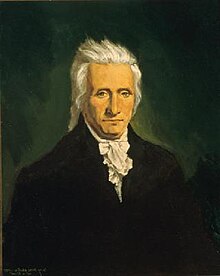Gabriel Duvall
| Gabriel Duvall | |
|---|---|
 |
|
| Associate Justice of the Supreme Court of the United States | |
|
In office November 18, 1811 – January 12, 1835 |
|
| Nominated by | James Madison |
| Preceded by | Samuel Chase |
| Succeeded by | Philip Barbour |
| Member of the U.S. House of Representatives from Maryland's 2nd district |
|
|
In office November 11, 1794 – March 28, 1796 |
|
| Preceded by | John Mercer |
| Succeeded by | Richard Sprigg |
| Personal details | |
| Born |
December 6, 1752 Prince George's County, Maryland, British America |
| Died | March 6, 1844 (aged 91) Glenn Dale, Maryland, U.S. |
| Political party | Democratic-Republican |
| Spouse(s) | Mary Bryce, Jane Gibbon |
| Religion | Anglicanism |
Gabriel Duvall (December 6, 1752 – March 6, 1844) was an American politician and jurist. Duvall was an Associate Justice of the Supreme Court of the United States from 1811 to 1835 during the tenure of Chief Justice John Marshall. Previously, Duvall was the Comptroller of the Treasury, a Maryland state court judge, a member of the U.S. House of Representatives from Maryland, and a Maryland state legislator.
Whether Duvall is deserving of the title of "the most insignificant" Justice in the history of the U.S. Supreme Court has been the subject of much academic interest, most notably a debate between University of Chicago Law Professors David P. Currie and (now-Judge) Frank H. Easterbrook in 1983. Currie argued that "impartial examination of Duvall's performance reveals to even the uninitiated observer that he achieved an enviable standard of insignificance against which all other Justices must be measured." Easterbrook responded that Currie's analysis lacked "serious consideration of candidates so shrouded in obscurity that they escaped proper attention even in a contest of insignificance," and concluded that Duvall's colleague, Justice Thomas Todd, was even more insignificant.
Born in Prince George's County, Maryland, as the sixth child of Benjamin Duvall (1719-1801) and his wife the former Susanna Tyler (1718-1794), Two of his elder brothers died in the American Revolutionary War. Duvall read law to enter the Bar in Prince George's county in 1778, where he practiced at least part-time until 1823. He soon moved to Annapolis, Maryland, where he practiced in the Mayor's Court as county prosecutor beginning in 1781, and in Anne Arundel County court beginning in 1783 (formally appearing in 600 cases by 1792 according to an archivist's research).
There is some uncertainty over the spelling of Duvall's name. One scholar noted Supreme Court Reporters Cranch, Wheaton, and Peters uniformly spelled it "Duvall," but Marshall's biographer, Albert Beveridge, insisted on spelling the name with a single "l." Journalist and Supreme Court specialist Irving Lee Dilliard (1904–2002) concluded persuasively that the original "DuVal" or "Duval" employed in earlier generations had become "Duvall" before the future Justice was born. Later family members used "DuVal".
...
Wikipedia
